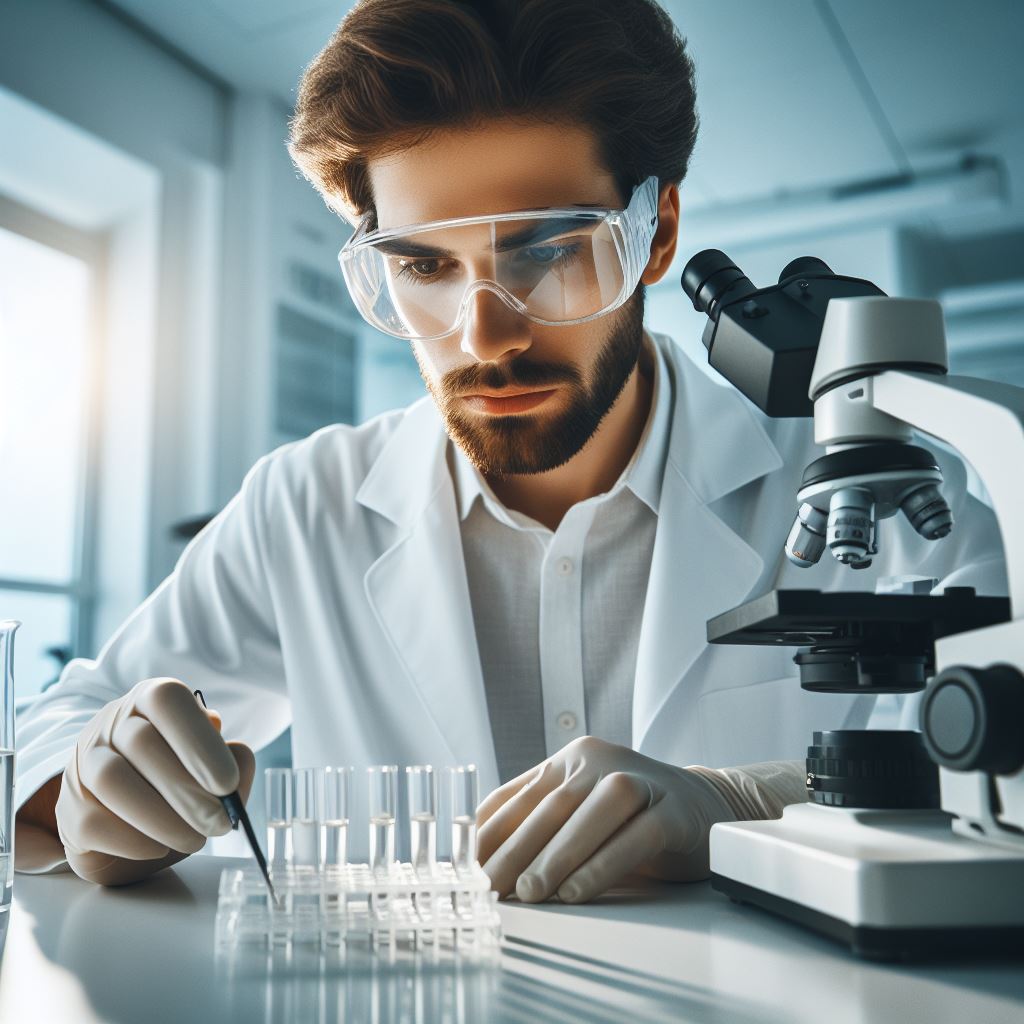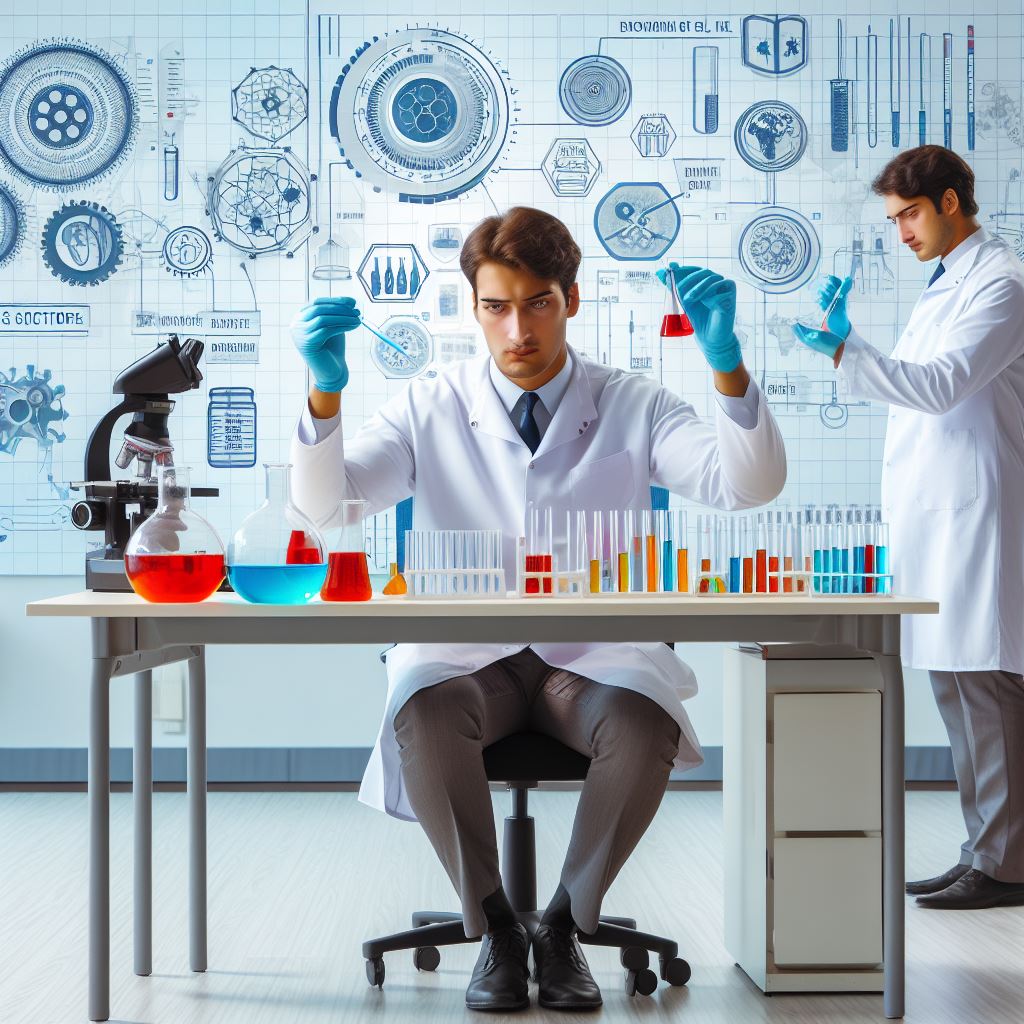Introduction
In various industries, lab technicians play a crucial role in conducting scientific experiments and ensuring accurate results.
Fields like healthcare, these professionals perform diagnostic tests, aiding in disease detection and patient care. In pharmaceuticals, lab technicians ensure the safety and efficacy of drugs through rigorous testing.
Environmental science relies on their expertise to assess pollution levels and monitor ecological health.
Additionally, in food and beverage industries, technicians uphold quality standards by scrutinizing ingredients and final products.
Their meticulous work is fundamental in maintaining safety, adhering to regulations, and advancing research, making lab technicians indispensable contributors to scientific progress and the integrity of numerous sectors.
The success of lab technicians heavily relies on possessing essential skills that are vital for their day-to-day tasks.
Essential skills are pivotal for the success of lab technicians as they directly impact the quality and reliability of scientific outcomes.
Proficiency in technical tasks, precision, and attention to detail ensure accurate experimental results, critical for valid conclusions in research and diagnostics.
Effective communication skills are crucial for conveying findings and collaborating with peers.
Adaptability and problem-solving abilities are essential in dynamic lab environments, enabling technicians to navigate challenges swiftly.
Additionally, a strong commitment to safety protocols prevents accidents and safeguards both personnel and experimental integrity. In essence, a combination of technical expertise, communication, adaptability, and safety consciousness underpins the success of lab technicians.
This blog post will focus on exploring the key skills every lab technician must possess to excel in their profession.
Strong Analytical Skills
The Significance of Analytical Skills in the Role of Lab Technicians
Lab technicians play a crucial role in various scientific research and analysis. One of the essential skills they must possess is strong analytical skills.
Analytical skills enable lab technicians to interpret data accurately and perform experiments with precision.
How Lab Technicians Use Analytical Skills to Interpret Data and Perform Accurate Experiments
Lab technicians are responsible for analyzing complex scientific data and drawing meaningful conclusions from it.
Having strong analytical skills allows them to identify patterns, trends, and relationships in the data.
By carefully analyzing the data, lab technicians can make accurate predictions and interpretations, leading to reliable experimental results.
Lab technicians also need to possess critical thinking abilities. They must be able to assess the validity and reliability of data presented to them.
Analytical skills empower lab technicians to identify errors or inconsistencies in experimental procedures, ensuring the accuracy and repeatability of experiments.
Examples of Specific Situations Where Analytical Skills Are Essential for Lab Technicians
- Data Interpretation: Lab technicians are often required to analyze large sets of data gathered from experiments. To make sense of this data, they need to possess strong analytical skills to identify trends, outliers, and anomalies that may impact the interpretation of results.
- Troubleshooting: In the lab, unforeseen issues or anomalies may arise during experiments. Lab technicians with excellent analytical skills can quickly identify the root cause of such problems and devise effective strategies for corrective action.
- Experimental Design: Before conducting an experiment, lab technicians must plan and design the procedure carefully. Analytical skills aid in assessing the variables involved, determining the appropriate controls, and devising a robust experimental setup.
- Method Development: Lab technicians are often involved in developing new testing methods or modifying existing ones. Strong analytical skills enable them to critically evaluate and optimize these methods for improved accuracy and efficiency.
Ultimately, analytical skills are vital for lab technicians as they enable accurate interpretation of data and successful experimentation.
Lab technicians with strong analytical skills are better equipped to handle complex scientific information, troubleshoot issues, and design effective experiments.
These skills are crucial for ensuring the reliability and validity of scientific research conducted in laboratory settings.
Attention to Detail
A lab technician’s ability to pay attention to detail is crucial for accurate and reliable results. The importance of attention to detail cannot be overstated in the field of laboratory work.
Highlighting the Importance
In a laboratory setting, even the smallest oversight can have significant consequences.
Whether it’s measuring an incorrect amount of chemical or overlooking a minute change in color, these oversights can lead to faulty data and inaccurate conclusions.
Unlock Your Career Potential
Visualize a clear path to success with our tailored Career Consulting service. Personalized insights in just 1-3 days.
Get StartedMoreover, attention to detail is vital for ensuring the safety of both the laboratory personnel and the integrity of the experiments.
By closely monitoring every step and aspect of a procedure, lab technicians minimize the risk of accidents and ensure that the results obtained are meaningful and reliable.
Adhering to Strict Protocols
Lab technicians must strictly adhere to protocols and follow procedures with precision. Every action they take and every decision they make must be carefully considered and executed.
Following protocols means not only carefully reading and understanding them but also implementing them exactly as written.
Any deviation, no matter how minor, can lead to inconsistencies and compromises the validity of the experiments.
Moreover, adherence to protocols ensures that experiments can be reproduced accurately by other researchers, contributing to the overall reliability and progress of scientific knowledge.
Examples of Consequences
A lack of attention to detail can have severe consequences in a laboratory.
For instance, overlooking a small contamination or impurity can completely alter the outcome of experiments, leading to erroneous conclusions.
Similarly, incorrect labeling of samples or mishandling of equipment can result in wasted time, effort, and resources.
Additionally, it may compromise the validity of the entire study, rendering it unreliable and potentially hindering future scientific advancements.
In some cases, the consequences can be even more significant, posing risks to human health or the environment.
For example, improper handling of hazardous materials due to inattentiveness can lead to accidents and contamination.
Overall, attention to detail is a fundamental skill that every lab technician must possess.
It ensures the accuracy, integrity, and safety of laboratory work, which are essential for the advancement of science and the betterment of society.
Read: Conservation Efforts by Canadian Biologists
Technical Competence
Emphasize the need for lab technicians to possess a wide range of technical skills
In order to excel as a lab technician, it is crucial to possess a wide range of technical skills.
The field of laboratory science is constantly evolving, and technicians must adapt to the latest advancements and techniques to ensure accurate and reliable results.
Discussion of specific technical skills that are essential for lab technicians, such as operating lab equipment, conducting tests, or utilizing software programs.
One of the most fundamental technical skills for lab technicians is the ability to operate various lab equipment.
This includes knowledge of how to calibrate, set up, and maintain equipment such as microscopes, centrifuges, and spectrophotometers.
A lab technician must be familiar with the functions and specifications of these instruments to perform experiments effectively.
Additionally, lab technicians must be proficient in conducting tests and experiments according to established protocols.
This involves following standard operating procedures (SOPs) with precision and accuracy.
A well-trained technician should be able to perform tasks such as pipetting, diluting solutions, and handling biological samples without error.
Moreover, the utilization of software programs is becoming increasingly important in laboratory settings.
Lab technicians must be comfortable navigating and using software dedicated to data analysis, statistical calculations, and experiment control.
They should be able to efficiently enter, manage, and interpret data using specialized software, which plays a vital role in generating accurate reports and conclusions.
Provided examples of how technical competence directly impacts the quality of lab work.
Technical competence directly impacts the quality of lab work in several ways. Firstly, possessing strong technical skills ensures reliable and repeatable results.
A lab technician who lacks technical prowess may make mistakes in operating equipment or conducting tests, leading to flawed outcomes.
This can undermine the credibility of the research and jeopardize the validity of any conclusions drawn.
Furthermore, technical competence allows lab technicians to troubleshoot and resolve issues effectively.
When unexpected problems arise during experiments, technicians with extensive technical knowledge are better equipped to identify the source of the problem and implement appropriate solutions.
This saves time, resources, and ultimately improves the overall efficiency of the lab.
Additionally, technical competence promotes adherence to safety and quality standards.
Lab technicians who are proficient in handling equipment and following established protocols minimize the risk of accidents and errors.
They ensure compliance with safety guidelines, such as wearing appropriate protective gear and disposing of hazardous waste properly.
Basically, lab technicians must possess a wide range of technical skills to excel in their role.
From operating lab equipment to conducting tests and utilizing software programs, these skills directly impact the quality and reliability of lab work.
Technical competence enables accurate and repeatable results, efficient troubleshooting, and adherence to safety and quality standards.
Continuous learning and improvement in technical skills should be a priority for every lab technician to stay abreast of advancements in the field of laboratory science.
Read: Top Canadian Universities for Aspiring Biologists

Critical Thinking Abilities
The Importance of Critical Thinking Abilities in Problem Solving and Troubleshooting
Lab technicians require strong critical thinking abilities to effectively solve problems and troubleshoot issues.
In a laboratory setting, unexpected challenges and complex situations often arise, demanding quick and efficient solutions.
Critical thinking abilities enable lab technicians to approach these problems effectively.
Having well-developed critical thinking skills allows lab technicians to analyze the issue at hand, consider potential causes, and devise appropriate solutions.
They can evaluate the available information, identify patterns, and draw logical conclusions.
This systematic approach aids in identifying the root cause of a problem and developing a well-founded troubleshooting strategy.
The Significance of Analyzing Options and Making Informed Decisions
Analyzing various options and making informed decisions is paramount for lab technicians.
They encounter situations that require choosing the most suitable course of action, selecting appropriate equipment or procedures, and determining the best approach for experimentation or analysis.
Being able to analyze options allows lab technicians to compare the advantages and disadvantages of different methods, equipment, or materials.
They can evaluate potential risks and benefits, considering factors such as accuracy, reliability, efficiency, and costs.
Making informed decisions based on this analysis ensures that lab technicians choose the most appropriate course of action, optimizing outcomes and promoting quality results.
Examples of Critical Thinking Abilities in Laboratory Situations
1. Troubleshooting Instrumentation Issues
Lab technicians encounter technical malfunctions with equipment and instruments.
Critical thinking skills help them identify the underlying problem and determine the necessary steps for repair or replacement.
2. Analyzing Experimental Data
Lab technicians must evaluate and interpret experimental data, looking for patterns and anomalies.
Critical thinking abilities enable them to identify outliers, inconsistencies, or potential errors that may affect the validity of results.
3. Problem-Solving in Research Projects
Lab technicians often face challenges when conducting research projects.
Critical thinking allows them to break down complex problems into manageable parts, developing strategies to overcome hurdles and achieve research goals.
4. Ensuring Safety and Compliance
Critical thinking abilities are crucial in ensuring laboratory safety and compliance with regulations.
Technicians must analyze potential hazards, assess risks, and implement appropriate safety measures to protect themselves, colleagues, and the environment.
5. Troubleshooting Test Results
Lab technicians need critical thinking skills to troubleshoot unexpected or conflicting test results.
They must consider potential causes, evaluate the reliability of the data, and identify any factors that may have influenced the outcome.
6. Designing Experimental Procedures
Critical thinking plays a vital role in determining the most suitable experimental procedures and protocols.
Lab technicians analyze the research objectives, available resources, and constraints to develop efficient and accurate experimentation plans.
In fact, critical thinking abilities are indispensable for lab technicians as they contribute to problem-solving, troubleshooting, and decision-making processes.
Analyzing options and making informed decisions ensure efficiency and accuracy in laboratory work.
Therefore, nurturing and honing critical thinking skills is essential for lab technicians to excel in their roles.
Read: Internship Opportunities for Biologists in Canada
Effective Communication Skills
The significance of effective communication skills in the role of lab technicians
Effective communication skills are vital for lab technicians to excel in their roles and contribute to the success of scientific research and experiments.
Lab technicians work in a fast-paced and collaborative environment, where clear and precise communication is essential to ensure accurate data collection and analysis.
Without effective communication, there is a risk of misinterpretation and errors, which can jeopardize the reliability and validity of research findings.
How lab technicians must communicate clearly with colleagues, supervisors, and other stakeholders
Lab technicians must communicate clearly with their colleagues to share information, coordinate tasks, and troubleshoot any issues that may arise during experiments.
By articulating their thoughts and observations effectively, lab technicians can avoid confusion and ensure everyone is on the same page.
Furthermore, lab technicians often work under the supervision of scientists or senior researchers.
Communicating with supervisors is important to seek guidance, report progress, and discuss any challenges or concerns.
Clear and concise communication allows supervisors to provide necessary support and guidance to lab technicians.
In addition to internal communication within the lab, lab technicians also interact with external stakeholders, such as researchers from other labs and industry professionals.
Effective communication with these stakeholders is crucial for collaboration and knowledge sharing.
Examples of how effective communication enhances lab technicians’ ability to collaborate and share findings
One example of how effective communication enhances collaboration is through the sharing of research findings.
Lab technicians need to communicate their results to colleagues and stakeholders accurately. This includes presenting data, explaining methodologies, and discussing potential implications.
Clear communication of research findings enables others to understand and replicate experiments, contributing to the advancement of scientific knowledge.
It also facilitates the exchange of ideas and feedback, leading to potential collaborations or improvements in experimental designs.
Another example of how effective communication enhances the abilities of lab technicians is by promoting teamwork.
Lab technicians often work in teams to conduct experiments, analyze data, and draw conclusions. Good communication within the team fosters a positive and efficient working environment.
By sharing information, asking questions, and providing feedback, lab technicians can collectively solve problems and achieve research goals more effectively.
Effective communication also helps in the allocation of tasks and division of responsibilities, ensuring smooth workflow and optimal resource utilization.
Furthermore, effective communication skills are essential for lab technicians when engaging in professional development opportunities.
Lab technicians may attend conferences, present their research, or publish scientific papers.
By effectively communicating their work to a larger audience, lab technicians enhance their professional reputation and open doors for future collaborations.
It also allows them to stay updated with the latest advancements in their field and contribute to scientific conversations.
Essentially, effective communication skills play a crucial role in the success of lab technicians.
Clear communication with colleagues, supervisors, and other stakeholders enhances collaboration, knowledge sharing, and teamwork.
By developing and honing their communication skills, lab technicians can contribute to the advancement of scientific research and excel in their roles.
Read: Canadian Biologists: Pioneers in Research
Adaptability and Flexibility
Importance of Adaptability and Flexibility for Lab Technicians
- Lab technicians need to be adaptable and flexible to handle the dynamic nature of their work.
- They must be able to adjust quickly to unexpected situations, changes in protocols, and new technologies.
- Adaptability and flexibility help lab technicians stay efficient and effective in their roles.
- These skills also enable them to collaborate with different teams and work on various projects simultaneously.
- Lab technicians who are adaptable and flexible can easily explore new research areas and methods.
Challenges That Lab Technicians Face
- Lab technicians often encounter unexpected situations or changes in protocols due to evolving scientific knowledge and methodologies.
- New research findings, discoveries, and equipment advancements frequently require lab technicians to modify their procedures.
- There may be urgent situations, such as equipment failures or time-sensitive experiments, that require quick adaptation.
- Lab technicians must also deal with the pressure of working within deadlines while maintaining accuracy and quality.
- Changes in staffing, project priorities, or funding can affect the workload and require adjustments from lab technicians.
Benefits of Adaptability and Flexibility in the Lab
- Adaptability and flexibility allow lab technicians to respond effectively to unexpected situations or changes.
- By being adaptable, lab technicians can quickly troubleshoot and find alternative solutions when faced with challenges.
- They can modify their workflows and experiments to accommodate variations in protocols or research requirements.
- Lab technicians who embrace adaptability are more likely to stay motivated and proactive in their work.
- Being flexible allows lab technicians to collaborate with different professionals and adapt to diverse research environments.
- Adaptable lab technicians are open-minded, willing to learn, and receptive to incorporating new techniques or technologies.
- Flexibility also ensures that lab technicians can adjust their schedules or priorities to meet unexpected demands.
- These skills improve problem-solving abilities, critical thinking, and decision-making in dynamic lab settings.
- Lab technicians who excel in adaptability and flexibility contribute to efficient and successful research outcomes.
- They foster a positive work culture by inspiring teamwork, cooperation, and effective communication in the lab.
In general, adaptability and flexibility are crucial skills for lab technicians.
The ability to adjust quickly and efficiently to unexpected situations or changes in protocols enables lab technicians to overcome challenges, explore new research areas, and maintain high-quality work.
These skills also promote collaboration, innovation, and an overall positive work culture in the lab.
Find Out More: Work-Life Balance in the Environmental Sector
Conclusion
The essential skills discussed in this blog post are attention to detail, technical expertise, and communication.
The blog post highlights crucial skills for professional success, emphasizing communication, adaptability, and critical thinking.
Effective communication, both verbal and written, is essential for collaboration and conveying ideas.
Adaptability involves embracing change and learning new technologies or methodologies. Critical thinking enables problem-solving and strategic decision-making.
Additionally, the post underscores the importance of creativity in generating innovative solutions. Time management and organizational skills are crucial for productivity.
Lastly, a strong work ethic and the ability to work well in teams are emphasized, promoting a well-rounded skill set for navigating the challenges of the modern workplace.
These skills are vital for the professional growth and success of lab technicians as they ensure accurate results, efficient lab operations, and effective collaboration with colleagues.
To excel as lab technicians, readers are encouraged to continue enhancing their skills through continuous learning and staying updated with industry advancements.




